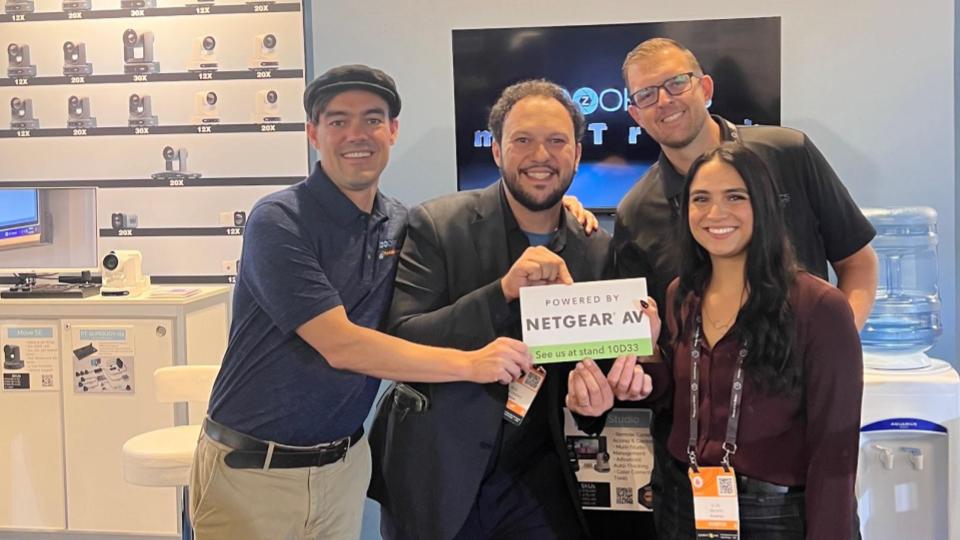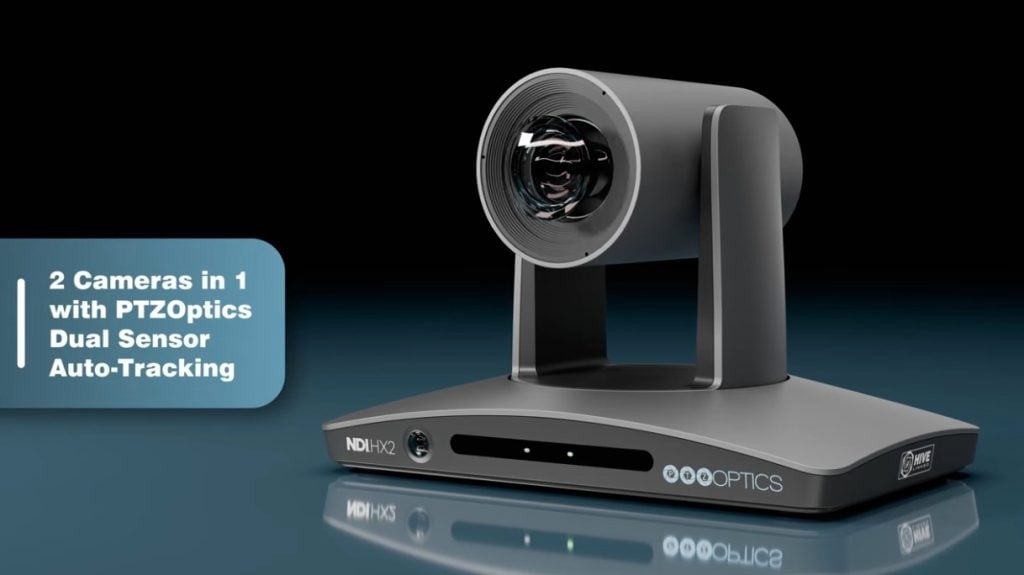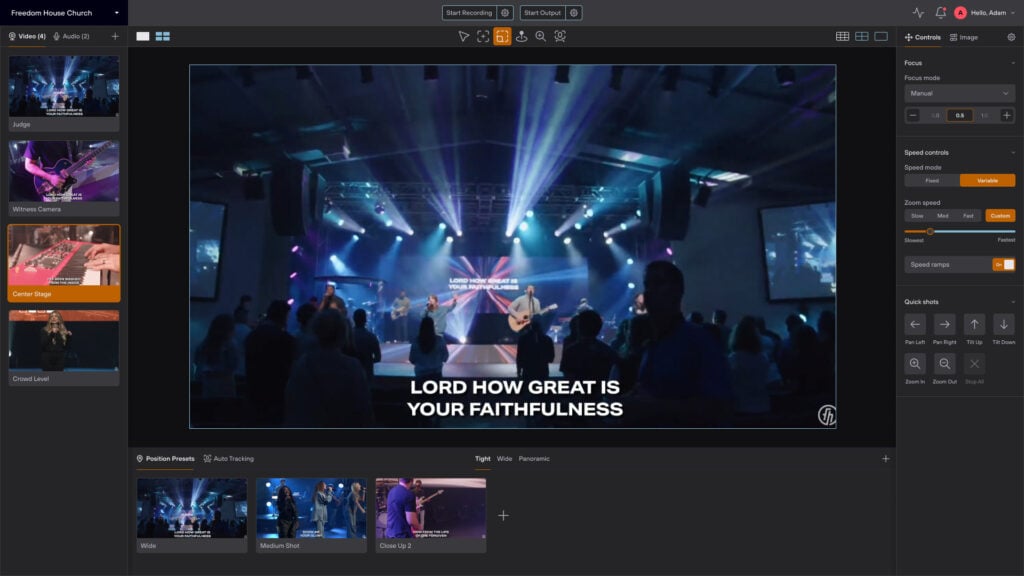How to Live Stream a Multi-Camera Band Performance
Written by Paul Richards on July 16, 2018
This week we reflect on our latest on-site video production for the Pretty Good Music Festival in Lincoln University, PA. This year we upped our game to include a multi-camera live streaming system completely IP connection with an ethernet switch. We also included new DJ lighting from Chauvet DJ allowing us to have a more fun atmospheric environment. So let’s take a look behind the scenes at our technology setup built to live stream to Facebook and record high-quality audio and video on site at this music festival.
Our Live Streaming Setup for Recording Bands
- Two PTZ Cameras on Truss
- Truss Mount
Let’s start with our live streaming cameras which were all powered over ethernet. Connecting all of our PTZOptics PTZ cameras to a local area network was the first step to creating an easy to use a live streaming system with our video production software vMix. Each camera was powered using a PoE switch so we did not need to provide additional power supplies for each camera. Each camera was assigned a static IP address which is used to communicate with the cameras from vMix and other software such as our iOS PTZ camera app. With each camera connected via Cat 53 Ethernet cabling, we then ran SDI cabling for video which was connected to our PTZOptics Producer Kit. The PTZOptics Producer Kit includes a 4-Port SDI connection box which connects to our Intel NUC Skull Canyon with a thunderbolt cable. The Thunderbolt cable has enough bandwidth to bring in all of our cameras at 1080p60fps at 3 Gbps without compression. We used our NDI-HX cameras which use the NewTek NDI compression during some parts of our show but preferred the uncompressed video signals through most of the broadcast.
- 4 Port SDI Box
- 16 Port PoE Switch
Multi-Camera Band Live Stream Setup
Once everything was connected to our Windows Based Intel NUC Skull Canyon computer we fired up vMix to add all of our inputs. Each camera input use pulled in using the Magewell SDI capture card which the computer sees as a PCIe video connection. Each camera in vMix then needs to be associated with the static IP address used for PTZ controls. So we had to get all of our cameras on the same IP range as our computer. If you are using a Windows computer you can use the command prompt to enter “ipconfig” which will report the IP address of your camera coming from the DHCP router that it is connected to (assuming your computer is setup for DHCP). Once you know the IP address of your computer you can safely assume the IP range of your Local Area Network. All of the devices you are planning to use for your video production should most likely be on the same IP range as your computer. So the first bit of setup for this years live stream was configuring our PTZOptics cameras with IP addresses that fit inside the range of our cameras. The process goes like this:
- Download the PTZOptics IP Address Settings Tool if you don’t already have it
- Search for the PTZOptics cameras on your network
- Right-click each and configure the cameras to the IP address that you need inside your IP range
- IP PTZ Controls
- IP Networking Plan
Mounting PTZ Cameras to a Truss
One major upgrade to our mult-camera live band streaming system was our camera mounting. This year instead of using regular camera tripods which people would walk in front of all the time, we used a Speaker Stand Truss System. These systems are usually known as 1.5″ Truss Pipe Tripod system which extend much higher in height than normal tripods. Using a C-Clamp with a quarter twenty camera connection we were able to mount our cameras to this Truss system. It gave us a level view point on the band which increased our video production quality and also removed the chance of people walking in front of our cameras during the concert. As you can see, we had two cameras mounted to the trussing system and a third camera mounted on a wall mount behind the band.
- Dual Camera Truss Mount
- Truss Mounting a PTZOptics Camera
- Truss Mount a PTZ Camera
The PTZ Drummer Camera!
Everybody loves the drummer camera we mounted behind the band and above the drummer. This camera was mounted on the wall using the HuddleCamHD HCM1 wall mount. We screwed the wall mount into the wall using 4 regular deck screws which secured the mount above the band. We then ran two long 75′ cables which were SDI and Ethernet to power the camera and get uncompressed 3G SDI video. The camera was easily controlled and put into our automated playlist which I will explain soon.
- PTZOptics Producer Kit Setup in Aciton
- NDI HX PTZ Camera
PTZ Camera Automation & Switching Controls
One of the best parts of having the cameras available on the LAN is the ability to automate pan, tilt and zoom preset position commands in a preset playlist. Using vMix we were able to quickly setup PTZ camera presets for each member of the band on stage. Using these presets we could reduce the need for camera operators and the entire live production was always handled by just one person. At one point I actually walked away from the broadcast and had the video switching and camera controls handled for me for over an hour.
Low Light Settings & DJ Lighting
This is the 4th year we have live streamed this event and by the time it got dark each year we were always unprepared. This year we were ready with our new PTZOptics Windows App that controls the Iris and Shutter Speed of our cameras directly through the cameras VISCA over IP API. This allows us to quickly adjust the cameras to manual exposure, set the iris and the shutter appropriately as it got dark. We also tweaked the contrast/luminance settings to really bring the depth of colors into view. Finally, we upped the gain just enough to boost our viewable images and increased our 2D and 3D noise cancellation options. We are planning a whole review on the ideal low light camera settings for live streaming so, I will just say that our DJ lighting really saved the day. These lights are generally used for parties and live music events to create an atmosphere that enhances the experience. Our Chauvet DJ Intimidator spotlight really made the band members pop out from the dark setting and I realized that low-light live streaming can be very fun. We even had a fog machine and other ambient lights… But more will come on low light camera setting I promise!
- Low Light Live Streaming
- Chauvet DJ Intimidator
- Chauvet DJ Intimidator on Truss
- Chauvet DJ Intimidator 255
Conclusion
After many years of live streaming, I have to say that the industry is changing very fast. Each year we bring new equipment with a different connection diagram. Yes, the world is moving toward IP, but it’s certainly not completely replacing the traditional SDI infrastructure. We share many of our new insights available on our live stream here. Thank you for taking the time to read this blog post and please let me know if you have any questions about our setup at [email protected]
Learn more on Monetizing Live Streaming
- How to monetize your next live event – here
- Selling Event Virtual Tickets and Private Live Streams – here
- Video Case Study on Virtual ticket sales – here
- Viewer Statistics for live streaming – here
- Here’s why Twitch is such a BIG opportunity for live streamers – here
- Did you know your town may have a Business Improvement District? They may help your set up a live stream! More here
Setting up a live streaming studio




















